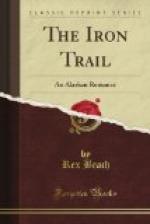Although it was nine o’clock when they boarded the launch, it was still light. The evening was yellow with the peculiar diffused radiance of high latitudes, lending a certain somberness to their surroundings.
The rushing tide, the ragged rock-teeth which showed through it, the trackless, unending forests that clothed the hills in every direction, awed her a little, yet gave her an unaccustomed feeling of freedom and contentment. The long wait out between the lonely islands, where the tiny cockle-shell rolled strangely, although the sea seemed as level as a floor, held a subtle excitement. Darkness crept down out of the unpeopled gorges and swallowed them up, thrilling her with a sense of mystery.
When midnight came she found that she was ravenously hungry, and she was agreeably surprised when O’Neil produced an elaborate lunch. There were even thermos bottles filled with steaming hot coffee, more delicious, she thought, than anything she had ever before tasted. He called the meal their after-theater party, pretending that they had just come from a Broadway melodrama of shipwreck and peril. The subject led them naturally to talk of New York, and she found he was more familiar with the city than she.
“I usually spend my winters there,” he explained.
“Then you have an office in the city?”
“Oh yes. I’ve maintained a place of business there for years.”
“Where is it? On Wall Street?”
“No!” he smiled. “On upper Fifth Avenue. It’s situated in the extreme southwest corner of the men’s cafe at the Holland House. It consists of a round mahogany table and a leather settee.”
“Really!”
“That’s where I’m to be found at least four months out of every twelve.”
“They told me you built railroads.”
“I do—when I’m lucky enough to underbid my competitors. But that isn’t always, and railroads aren’t built every day.”
“Mr. Gordon is building one.”
“So I’m told.” O’Neil marveled at the trick of fortune which had entangled this girl and her mother in the web of that brilliant and unscrupulous adventurer.
“Perhaps it will be a great success like your famous North Pass & Yukon Railway.”
“Let us hope so.” He was tempted to inquire what use Gordon had made of that widely advertised enterprise in floating his own undertaking, but instead he asked:
“Your mother has invested heavily, has she not?”
“Not in the railroad. Her fortune, and mine too, is all in the coal mines.”
O’Neil smothered an exclamation.
“What is it?” she demanded.
“Nothing, only—are you sure?”
“Oh, quite sure! The mines are rich, aren’t they?”
“There are no mines,” he informed her, “thanks to our misguided lawmakers at Washington. There are vast deposits of fine coal which would—make mines if we were allowed to work them, but—we are not allowed.”




